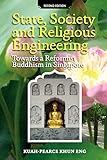State, Society and Religious Engineering : Towards a Reformist Buddhism in Singapore / Kuah-Pearce Khun Eng.
Material type: TextPublisher: Singapore : ISEAS Publishing, [2009]Copyright date: ©2009Description: 1 online resource (351 p.)Content type:
TextPublisher: Singapore : ISEAS Publishing, [2009]Copyright date: ©2009Description: 1 online resource (351 p.)Content type: - 9789812308658
- 9789812309136
- 294.337095957 22
- BQ569.S52 K83 2009
- online - DeGruyter
| Item type | Current library | Call number | URL | Status | Notes | Barcode | |
|---|---|---|---|---|---|---|---|
 eBook
eBook
|
Biblioteca "Angelicum" Pont. Univ. S.Tommaso d'Aquino Nuvola online | online - DeGruyter (Browse shelf(Opens below)) | Online access | Not for loan (Accesso limitato) | Accesso per gli utenti autorizzati / Access for authorized users | (dgr)9789812309136 |
Frontmatter -- Contents -- List of Diagrams -- Note on Romanisation -- Preface to the Second Edition -- Acknowledgements to the Second Edition -- Introduction -- PART 1: INVENTING A RELIGIOUS TRADITION -- 1. Reinventing Chinese Syncretic Religion: Shenism -- 2. Communicating with Gods, Deities and Spirits -- PART 2: STATE, SOCIETY AND RELIGIOUS ENGINEERING -- 3. Bureaucratising the Temple and the Sangha -- 4. Establishing an Ethno-Religious Framework and the Religious Law -- 5. Buddhist Welfare and Charity -- 6. Experimenting with Religious Values as Asian Values -- PART 3: TOWARDS A REFORMIST BUDDHISM -- 7. Towards a Reformist Buddhism -- 8. Members and Their Religiosity -- 9. Competing Claims of Modernity and Class Identity: 271 Christianity versus Reformist Buddhism -- Conclusion -- Postscript to the Second Edition: Towards a Humanist and Socially-engaged Buddhism -- Glossary -- Bibliography -- Index
restricted access online access with authorization star
http://purl.org/coar/access_right/c_16ec
The book looks at how religion in Singapore is being subjected to the processes of modernisation and change. The Singapore State has consciously brought religion under its guidance. It has exercised strong bureaucratic and legal control over the functioning of all religions in Singapore. The Chinese community and the Buddhist Sangha have responded to this by restructuring their temple institutions into large multi-functional temple complexes. There has been quite a few books written on the role of the Singapore State but, so far, none has been written on the topic - the relationship between state, society and religion. It will help to fill the missing gap in the scholarly literature on this area. This is also a topic of great significance in many Asian, particularly Southeast Asian, countries and it will serve as an important book for future reference in this area of research and comparative studies.
Mode of access: Internet via World Wide Web.
In English.
Description based on online resource; title from PDF title page (publisher's Web site, viewed 01. Dez 2022)


